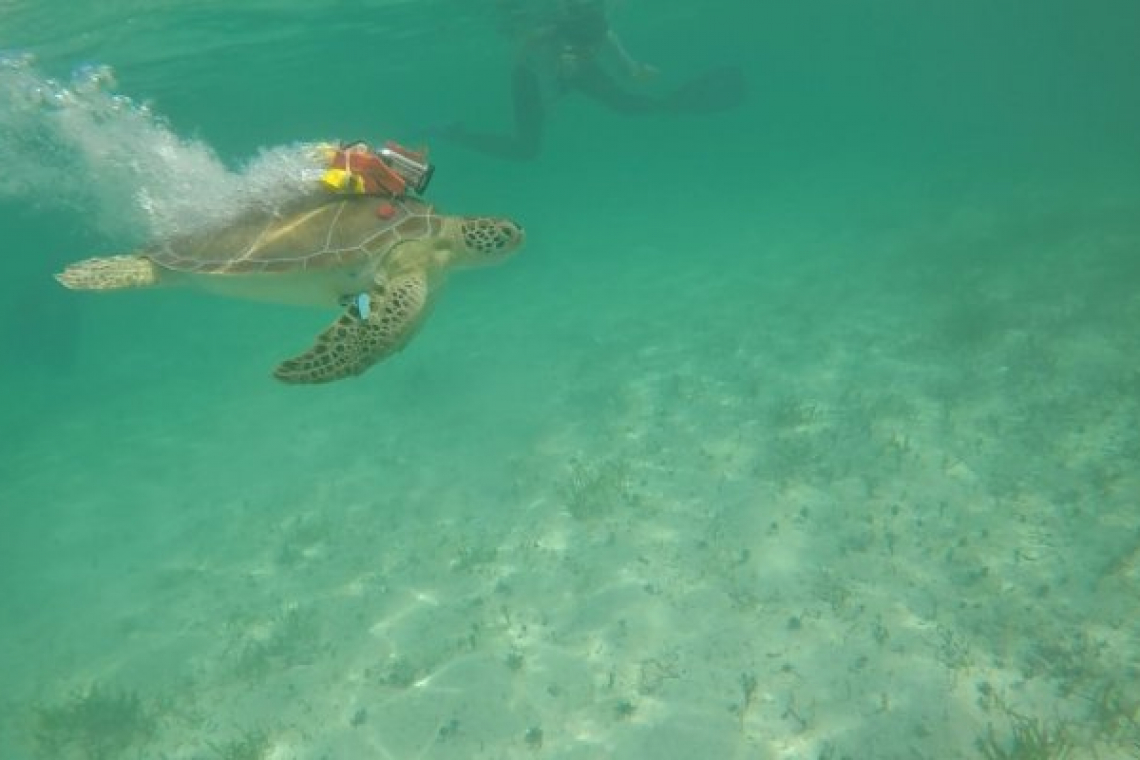A turtle swims with a TurtleCam mounted on its back.
NASSAU, The Bahamas--Young green turtles’ behaviour is influenced by tourists feeding the animals. This was discovered by researchers of Wageningen University & Research through the use of TurtleCams: cameras mounted on the shells of green turtles in the Bahamas. This is the first time scientists have used such cameras to record the interaction between tourists and animals for scientific purposes.
The green turtle is an endangered species, the population of which has plummeted. The animals must continuously adapt to – amongst other things – habitat loss and climate change. The increasing influence of tourists poses an extra threat to the species, Fee Smulders, PhD candidate in Aquatic Ecology and Water Quality Management, discovered.
New camera system
Wageningen researchers developed a new, low-cost global positioning system (GPS) camera system in collaboration with co-author Owen O’Shea of the Centre for Ocean Research and Education in the Bahamas. This system allowed them to film the behaviour of five green turtles for five hours. After five hours, the adhesive with which the camera was attached dissolved, allowing the device to float to the surface. Following the GPS signal, the researchers then retrieved the cameras.
The recorded images not only revealed how the five turtles that were equipped with a camera behaved, but also showed footage of other green turtles without cameras. The footage is available online through the link of the open-access paper. Smulders: “Using cameras in this way allows us to narrate the wild animals’ own story, about their natural behaviour and their interaction with humans.”
New food source
Green turtles in their natural habitat are mostly vegetarians. Seagrass is their staple food. The TurtleCam footage, however, showed tourists feeding the animals bits of squid. The researchers calculated that the turtles’ seagrass consumption was reduced six-fold when tourists were in the area. In the long run, their body will evolve to accommodate such new food sources, making them dependent on fish and meat, which are not always available. This poses an additional challenge for the already endangered animals.
Aggressive
In addition to changes in their diet, the scientists also noted a change in behaviour. These naturally calm animals exhibited aggressive behaviour towards each other, in competition over food, and towards the tourists. “They probably confused hands and fingers with food,” Smulders thinks. The competition for food and related aggression worsened when the coronavirus pandemic caused a sudden drop in tourism in 2020.
The TurtleCams revealed that green turtles purposely swim towards boats and humans. “Normally, we use special nets to catch the turtles for research purposes. Here, we could simply scoop them out of the water with our hands,” says Smulders. “The animals being this tame is a threat.” It increases the risk of injury through, for example, boat propellers, and makes them vulnerable to poachers. Although poaching is strictly prohibited, poachers still operate all over the world. “Sadly, we discovered our prediction was correct: a poacher recently extracted eight green sea turtles from the waters at our research location,” Smulders states.
Global issue
Following an online search, the team discovered that tourists across the globe feed sea turtles – not just the green sea turtle, but also two other (critically) endangered turtles, the loggerhead turtle and the hawksbill sea turtle. “This leads us to believe that the change in diet and behaviour of the sea turtles occurs in all their habitats, from Australia to Tenerife,” says Marjolijn Christianen, assistant professor at Wageningen University & Research.
“Our research shows the dangers of feeding wild sea animals,” Christianen states. “To mitigate the damage and protect the turtles, we must communicate the consequences of this feeding activity to tourists around the world.” The researchers published their findings in the scientific journal Global Ecology and Conservation. ~
Wageningen University & Research ~







